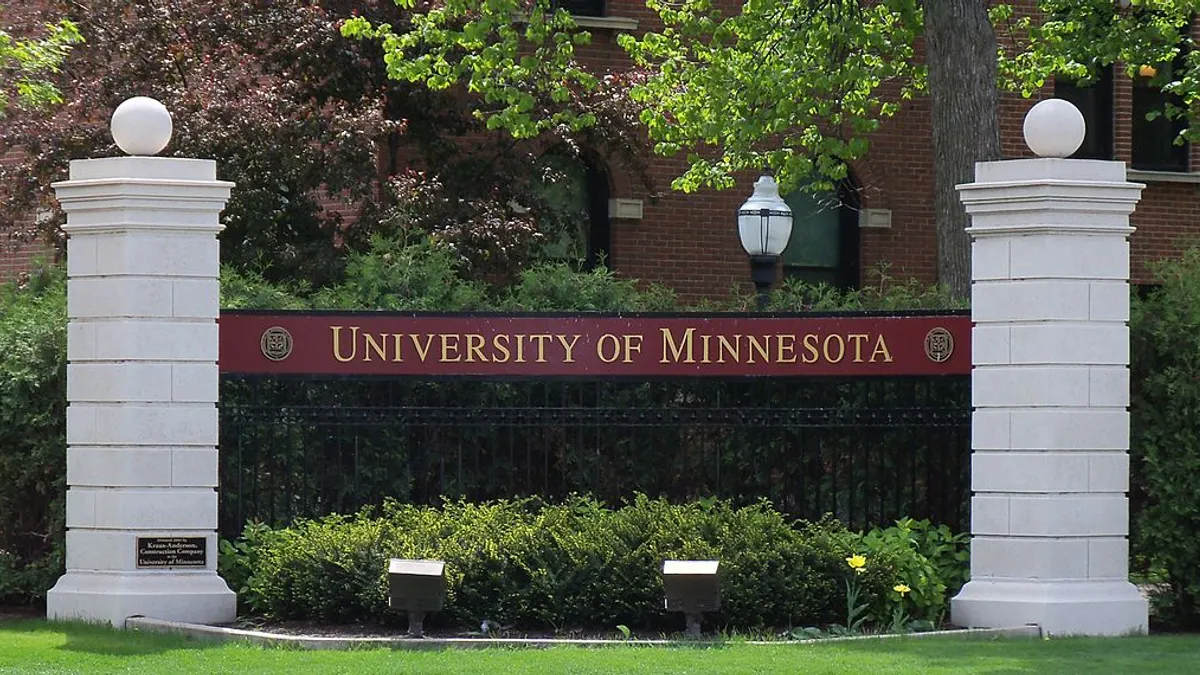As automation replaces millions of low-skill jobs in the U.S., the economies of some states that rely on manufacturing or have large rural regions, such as Louisiana, are left particularly vulnerable to this so-called "robot revolution."
Higher education leaders in Louisiana have a plan to help their workers adapt. Earlier this year, the state's board of regents laid out a new attainment goal. Board members are aiming to raise the share of adults ages 25 to 64 who hold a postsecondary credential from 44% to 60%. They also want to double the number of credentials produced annually by 2030.
Doing so will require expanding access to higher education for certain populations, including African Americans, adult students, student-parents, and people who are incarcerated or formerly incarcerated, according to the plan.
"More than 40 states have set attainment goals, (and) the conversations are very similar," Kim Hunter Reed, Louisiana's commissioner of higher education, told Education Dive. "You have to address your equity gaps. You have to be intentional about supporting adults. No state will reach its goal without addressing those populations successfully."
Some states are responding to these challenges by adding more need-based aid instead of merit aid that disproportionately benefits white students with high family incomes. In Louisiana — which has caught flak for having a large merit-aid program — lawmakers will soon weigh in on whether to add $34 million in need-based aid.
To learn more about the master plan and how the board of regents plans to reach those goals, Education Dive spoke with Hunter Reed about what's next for higher education in Louisiana.
EDUCATION DIVE: How did you arrive at the goals laid out in the master plan?
HUNTER REED: By next year more than half of jobs (nationwide) will require a credential beyond high school, so we know that the economy is changing and that we need to make sure more people can participate in that economy. We built a plan to try to see what it would take for us to get there, specifically taking on our equity gaps, our adult learners, and our access and success challenges.
When you have budget cuts and challenges, people get into a survival mode. And now that we've had some stability, it allows people to take a deep breath and say, "What do we want to do? What is our aspiration?" This plan gives us a chance to have that conversation.
What do you think are some of the biggest challenges in meeting the state's 60% attainment goal?
HUNTER REED: Louisiana's economy has been one where you could earn a sustainable living wage with just a high school diploma. We have work to do to make a case for why credentials of value beyond high school are critical to our state. We also have to make sure that our educational experiences for students are relevant, affordable and attainable.
Louisiana's board of regents is asking the state for a 14.5% increase in funding for higher education. How do you plan to convince lawmakers this is important?
HUNTER REED: We've had one of the largest divestments in higher education in the nation, and last year was our first base increase in 10 years. So we're doing a couple of things. We are talking about the master plan with business and community leaders, new legislators, the governor, and community and education partners to build support for our vision.
Staff is attending new legislator orientation. They're speaking directly to them about what we're trying to do and making sure they understand that this is not higher education saying, "Woe is us, we need more money." This is a very specific talent development exercise that we want to bring forward to our state. We think it will make Louisiana more prosperous.
Some economists have been forecasting a recession. How would that complicate the master plan?
HUNTER REED: The challenge, of course, is around public finance. When Louisiana had a large disinvestment in higher ed, it also had one of the largest tuition increases in the country (from 2008 to 2018). In a state where one in five people are in poverty, I worry about affordability a lot. We have to think about what that would mean for access and success for our citizens.
What do you think is the right mix of need- and merit-based aid?
HUNTER REED: Louisiana has a very large merit program and a very small need-based aid program, so we need to significantly increase it. We asked for $34 million in need-based aid, but to give every eligible student the maximum fund is more than a $100 million request.
So what's the right amount? It's certainly more need-based aid than what we have now.
How do you plan to boost African Americans' college-going and completion rates?
HUNTER REED: In an Education Trust report, Louisiana had the lowest rate of African-American educational attainment in the nation. We have to raise awareness around these issues, make sure we're looking at our data to see what's happening with our subgroups and ask very hard questions. Why are certain populations succeeding and others not? What does that mean for the kinds of wraparound services and tutoring and support that students will need? We're thinking more intentionally about asking the right questions that allow us to bring intentional support to student populations to move them through.
How does the state plan to better support adult students?
HUNTER REED: Higher education, in the past, thought about transportation, child care, and food and housing insecurity as life challenges that you needed to address before you came to us. Now we are thinking more deeply about those as barriers to student success, and we're in more conversations around how we can support students so that they can participate and effectively get their credentials.
The master plan says Louisiana will roll out a statewide policy for prior-learning assessments, which could help adults earn credentials for their on-the-job learning. How is that progressing?
HUNTER REED: I've just hired our new academic officer. An item on his agenda will be to inventory best practices around the state and nation, to have a conversation around how we think about skills and competencies, industry needs, and the educational translation and recognition of that work so people can stack their experiences into credentials.
There's a lot of conversation around prior learning assessments, both in the military — thinking about military credits — but also thinking about adults who have significant work experience. We're interested in not just having a statewide policy but evolving a system that moves from diplomas as a proxy for learning to a system that is really skills- and competency-based.
Big employers have been more involved with working with institutions to craft curriculum that fits their needs. How is that happening in Louisiana?
HUNTER REED: We have a partnership in Louisiana with Amazon Web Services with our entire community college system. We also have approved undergraduate certificates at our four-year institutions at the request of IBM, DXC, CenturyLink and other industry partners. They've recognized that students who have liberal arts degrees are on a different track, but if they get that undergraduate certificate in technology, coding or computer science, it can help them to be more marketable in multiple ways.
It's important to really think about what skills and competencies are needed and how we embed those into students' educational experiences so they have multiple ways to enter the marketplace.







